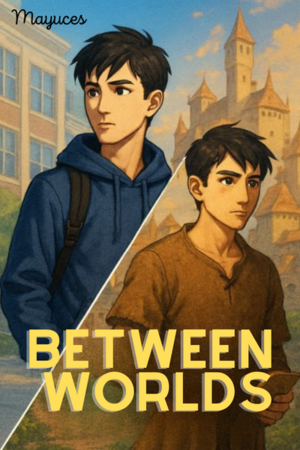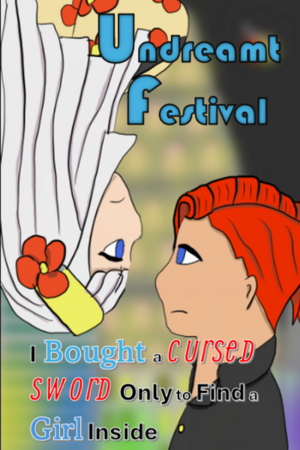Chapter 11:
Jeffrey Paragraph’s Midlife Crisis
Error 404: Language Not Found
Dear reader,
...
...
Can you see me?
No, don’t answer that. I don’t want to know.
Because if you can see me, then that means Rajan isn’t a fluke. It means I’m visible. Tangible. Perceivable. Which is not a word narrators are supposed to be.
Omniscients don’t get seen. We observe from the shadows. We describe sunsets and sigh dramatically at character arcs. We don’t get acknowledged. That’s like a ghost getting called by name. It’s terrifying.
He looked straight at me. Made eye contact. Addressed me like I was just another guy standing next to a suspicious parrot and a cargo sack that kept growling.
And when I panicked and told him my name was Jeffrey Paragraph, he didn’t even blink. He smiled. Like he already knew.
So now I have a problem.
If I can be seen, can I be affected? Can I get sick? Can I be… Babelized?
What if I start losing words? What if metaphors vanish? What if my verbs just… stop?
What if one day I try to describe a flower and all I can say is “Petal boom good-smell circle stick”?
What if I forget how to narrate?
Or worse…
What if I have to go back to being a normal narrator?
Look, I know I said I missed being omniscient. That I longed for the comfort of knowing everything.
But there’s something addictive about not knowing. About watching a story unfold like a badly folded road map on fire. About being surprised.
For the first time in forever, I’m not ahead of the story.
I’m in it.
And I don’t know where it’s going.
But I do know this:
Kaito’s stalling. I’m spiraling. And this chapter might be the beginning of something important.
So let’s keep going.
Even if I have to do it as Jeffrey Paragraph.
And even if I don’t know how this ends.
Yet.
------------------------------------------------------------------------------------------------------------------------
The Technocratic Republic of India was terrifyingly efficient.
Need a drink? A vending drone buzzed overhead with three hydration options and a coupon for scented towels. Need directions? Sidewalks lit up with arrows customized to your shoe size and destination. Hana tested it by asking for “the closest functioning brain,” and it pointed her toward a university.
Even the cows here wore QR codes.
Naturally, this was the perfect place to stall.
Kaito had woken up that morning with one mission: avoid the UN meeting at all costs.
“Look at this view!” he said, pointing at a rooftop garden where the grass played jazz when you walked on it. “We can’t meet with anyone while this level of innovation is happening. That would be rude.”
Rajan stood nearby, arms politely folded, the picture of patience.
“You do realize the official is just two blocks from here,” he said.
“Which is exactly why we’re going this way,” Kaito replied, doing a sharp ninety-degree turn toward a café with chairs that massaged your back based on your emotional state.
Sota followed, sipping a mango lassi in defeat. “What harm can it cause to explore around a little. It's not like we find every day a society that still thrives in this day and age.”
Hana didn’t say anything. But her eyebrows had reached a level of skepticism usually reserved for suspicious emails and cursed IKEA instructions.
“Let me guess,” she said, watching Kaito admire a tree that dispensed biodegradable pamphlets. “Next you’re going to want to tour the city's waste-processing facility.”
Kaito gasped. “They have one?”
“I was joking.”
“Rajan, can we—?”
“Yes,” Rajan said. “I’ll pencil it in before your diplomatic accountability session.”
Kaito winced. “Can we not call it that?”
“What would you prefer?”
“...An optional trauma workshop.”
“Duly noted.”
The rest of the day passed in a blur of desperate detours.
They visited a museum that featured "The World's Largest Punctuation Mark.” It was a giant semicolon, ten meters tall, rotating slowly in a glass dome. Sota stared at it for a full minute before whispering, “I’m not smart enough to understand this.”
At a tech bazaar, Kaito bought a solar-powered spoon that could vibrate if your soup got too cold. “This,” he said with a completely straight face, “might save us.”
Then they found a park where artificial birds sang AI-generated melodies meant to replicate joy. The parrot challenged one to a duel.
“You call that music?” it screeched, puffing up. “I’ve choked on bread that had better rhythm!”
The AI-bird responded by playing a minor chord so aggressively that it made a toddler cry.
Meanwhile, Kaito dragged the team from stall to stall, trying every type of fried, pickled, and rehydrated food he could find. “We don’t know when we’ll eat next,” he said. “This could be our last chance.”
Hana gave him a long stare. “We’re in a utopia. They have apps that schedule your next snack.”
“The UN official is still waiting,” Rajan said with that perfect smile.
Kaito nodded enthusiastically. “Oh, absolutely. Definitely. Soon.”
Then he spun to the others and said, excited, "Is that a vending machine that dispenses compliments. We have to try that. Now!"
Everyone rolled their eyes. Parrot included.
And while all that happened, I followed. Pen in hand, taking notes.
Until it happened...again.
A man walked by me.
Not one of the trio. Not Rajan.
Just… a guy. Plain suit. Slicked hair. Carrying a tray of what looked like miniature samosas and self-esteem.
He paused.
Turned.
And handed me one.
“Energy food?” he said with a polite smile, like I was just another tired citizen and not, you know, a narrator-journalist caught in a metaphysical identity spiral.
I blinked.
“You… see me?”
He just smiled. “Everyone sees the press these days.”
Then he walked off.
I stood there holding a tiny samosa and a mountain of dread.
Because that man didn’t seem magical. Or prophetic. Or even particularly interesting.
He was just a person.
And he could see me.
Me.
What’s next? Do I start aging? Do I get taxes? What happens if I catch the Babel Virus? What if one day I go to describe a metaphor and it just comes out as “emotional spaghetti”?
I tried testing it. I tried narrating a simple action.
Kaito walks into frame, chewing something suspiciously orange.
Okay, so that one worked.
But later, I tried describing a sunset and all I could think of was: “Big light go down. Colors exist. Feels… wow.”
I sat down on a bench. And then immediately questioned whether benches still counted as furniture or if they’d evolved into sentient seating consultants.
Someone next to me asked, “Are you okay?”
I told them I was just tired.
But the truth is—I’m scared.
What happens to the narrator when the story itself starts falling apart?
I don’t want to fade into linguistic dust. I don’t want to vanish mid-paragraph like a forgotten footnote. I just wanted to tell a good story. Or at least survive until the ending.
Maybe it’s time to stop playing journalist. Maybe my parents were right.
Maybe an omniscient being can’t be a journalist.
They always said I was being foolish. “Stick to narration,” they told me. “It’s clean. It’s safe. It comes with a cosmic dental plan.”
But no. I wanted more. I wanted boots on the ground. I wanted adventure. I wanted to feel the story—not just tell it.
And now here I am. Questioning my verbs. Glitching out mid-sunset. Being seen by people who aren’t supposed to know I exist.
Maybe this is my punishment. For bending the rules. For chasing a dream that was never meant for someone like me.
Maybe it’s time to give up this whole “journalist” thing and crawl back into the safety of third-person omniscience.
Unseen. Unfelt. Untouched.
But then again…
part of me doesn’t want to go back.
Because despite the fear, despite the unraveling syntax in my head…
This is the first time I’ve felt real.
I’m not just watching the world end anymore.
I’m in it.
And somewhere, Kaito is doing the exact same thing.
I caught back with the trio in the central plaza, an area framed by lush vertical gardens and marble benches that adjusted based on posture.
A large screen flickered on the far wall—a smooth, curved display embedded into a structure shaped vaguely like a lotus. It didn’t play ads or propaganda, just muted news loops with subtitles in dozens of languages, each glitching a little more with every passing day.
At first, the trio wasn’t paying attention.
Kaito was pretending to enjoy a juice that tasted suspiciously like fermented carrot. Sota was trying to train the parrot to say something uplifting (“You're all gonna die!” didn’t count). Hana had her arms crossed, watching Kaito like a hawk who’d been promised a confrontation and was getting impatient.
Then the subtitles caught Hana’s eye.
“It has now been exactly three months since the United Nations declared the impending end of linguistic stability. No new updates. Languages continue to fail. Emoji-based communication sees 30% rise in legal usage…”
“Three months?” Hana said, her voice sharp.
Kaito froze. His breath caught in his throat.
Three months.
They’d been running for three months.
Then Hana turned slowly to Kaito.
He was already backing away.
“Oh no,” Sota said. “He’s gonna try to escape into a fruit stall again, isn’t he?”
“Kaito,” Hana said calmly. “Why are you avoiding the UN guy?”
Kaito fidgeted. “I'm not avoiding him. We’ve been exploring.”
“For a day and a half.”
“We needed rest!”
“You insisted we try seventeen different flavors of street corn.”
“They were good! And… it’s been stressful. And maybe I’m just not ready to—”
“To what Kaito?” Hana stepped closer.
Kaito sighed, shoulders slumping. “To find out if this really is all my fault.”
Silence.
Even the parrot stopped talking.
“I thought if we just… didn’t meet him,” Kaito continued, voice quieter, “maybe we’d never have to hear it. Maybe the world ending would stay vague. And I could just pretend that it wasn’t me. That I didn’t cause all of this just because I missed one stupid lesson.”
He sat down on the edge of a bench.
“You really think it’s your fault?” Sota said.
“I don’t know. But everyone else seems to.”
Hana stood still for a moment.
Then, surprisingly, she didn’t lecture.
She just sat on Kaito’s side.
“Even if it is your fault,” she said quietly, “you’re not running from it. Not anymore.”
Kaito looked up.
“I guess not.”
They sat in silence for a moment—three fugitives, one parrot, and a screen counting down the days left of the world.
“Good. Now get up.”
Kaito blinked. “Huh?”
“You can’t fix anything if you’re still on your ass,” she said.
Sota gave him a hand. “Come on. The world's ending. No time for breakdowns.”
Kaito let them pull him to his feet.
He nodded.
Then exhaled.
“All right. Let’s go meet the UN guy.”
The parrot flew back to Sota's shoulder.
"We're all gonna die," It said.
From my perch above, I watched them walk away—three awkward heroes and one emotionally unsupportive parrot.
And for the first time in a long time, I didn’t write anything.
I just… watched.
Listened.
Felt.
Because somehow, in the middle of all this chaos and language rot and owl-themed vengeance, I found something I hadn’t expected.
A story I didn’t know the ending to.
And maybe my parents were right. Maybe omniscient beings aren’t supposed to chase pipe dreams. Maybe journalism really was a mistake.
But…
If uncertainty is the price of discovering something real.
Then maybe I’ll keep paying.
Maybe I’ll stay with them—these sentence-wrecking weirdos.
Maybe I’ll follow this story to its very last vowel.
Because I might not know how it ends.
But I know one thing for sure.
I’m not done writing it.




Please sign in to leave a comment.